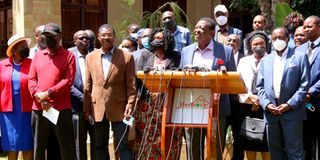Premium
Some are in it for the crumbs

One Kenya Alliance principals led by (right to left Kalonzo Musyoka (Wiper Party), Musalia Mudavadi (ANC), Moses Wetangula (Ford Kenya) and Senator Gideon Moi (Kanu) address journalists at Hermosa hotel in Karen, Nairobi on January 5, 2022.
What you need to know:
- Perhaps if the OKA principals had started earlier, they would have created a vibe, a momentum, an appetite for their kind of thing.
- Their personalities and type of politics, which tends to be largely sober and rational, is not given to creating strong passions among followers and opponents.
Amani National Coalition leader Musalia Mudavadi has been teasing an event at Bomas of Kenya, presumably an announcement that he was going to run for President against Raila Odinga of the Azimio la Umoja coalition and United Democratic Alliance’s William Ruto.
Mr Mudavadi is a member of the One Kenya Alliance, a grouping of senior politicians, among them Wiper leader Kalonzo Musyoka, Baringo Senator and Kanu boss Gideon Moi and Mr Moses Wetang’ula, the Ford-Kenya leader. Mr Musyoka had a blessing ceremony last weekend, where he was “released” by his supporters and community leaders to seek bigger things.
These are senior politicians indeed: Mr Mudavadi and Mr Musyoka were in politics when I was a schoolboy and I was still a student when they were appointed to the Cabinet. And I’m all of 52. In terms of chronological longevity and experience, these guys are way older than President Uhuru Kenyatta and in terms of government and parliamentary service, older than even Mr Odinga.
Mr Wetang’ula was nominated to Parliament in 1993 by then President Daniel arap Moi and has served as Foreign and Trade minister and Senate minority leader. Mr Musyoka was first elected to Parliament before 75 per cent of the population of Kenya was born — in 1985 — and has served in senior positions like Vice-President and Foreign Affairs Minister.
Mr Mudavadi is equally a flavour from the 1980s, first elected unopposed in 1989 to take his father, Moses Mudavadi’s Sabatia seat when the old man, a friend and confidant of Moi’s, died. He is also another former Vice-President, serving in the last Kanu government, and deputy to Prime Minister Odinga in the Government of National Unity with President Mwai Kibaki.
Mr Moi inherited his father’s Baringo Central — known as ‘Beringo ya kerri’ to polo players — parliamentary seat and now represents Baringo County in the Senate.
Low-wattage personality
Whereas each one of them has a right to run for any office in the land — and they are quite qualified, by our standards, for most public sector jobs — if any were to run for President on their own I would be prepared to bet, with minimal risk of loss, that they would not win. As a matter of fact, in my opinion, even as state projects, because of a combination of many factors, they would struggle to defeat DP Ruto and Mr Odinga, either jointly or severally.
Why? Several reasons. First, perhaps the season and timing is not in their favour. If you taste the air, their scent is missing in the cadre of viable presidents in the making. Perhaps if they had started earlier, they would have created a vibe, a momentum, an appetite for their kind of thing.
Secondly, their personalities and type of politics, which tends to be largely sober and rational, is not given to creating strong passions among followers and opponents. They have the type of low-wattage personality that fades fast.
Thirdly, they don’t work obsessively hard at politics and, therefore, don’t win big in the power stakes. They have lives; they don’t eat and drink politics like the top two contenders.
Finally, they are victims of devolution, which has created county-level powerhouses to rival their national or traditional community-wide chieftain roles. The combined political might of Governors Alfred Mutua, Kivutha Kibwana and Charity Ngilu may equal or exceed Mr Musyoka’s.
And one has to wonder who, between Mr Mudavadi and Governor Wycliffe Ambetsa Oparanya, calls the shots among the good people of Kakamega and is, therefore, the sure bet to deliver their vote. Mr Moi, though in Kenyan politics is top-hole pedigree, has not lost community leadership — because he never had it in the first place.
Forcing a run-off
I’m not saying these folks can’t win. I’m saying I stand a much better chance of winning the Miss Kenya beauty pageant. So what’s the point of running?
It’s not for me to talk about ego, vanity and mindless ambition; I leave such things to others. I will focus on the more practical political calculations. A candidate who wins the presidency needs to be able to govern, and that requires control of both the Senate and the National Assembly.
Enter post-poll coalition-making, where parties enter into an arrangement to support the winning side in exchange for a share of power. Therefore, these good people will run and cut power deals after the election.
There could also be the spoiler effect — where their candidacy denies the frontrunners a first-round victory, forcing a run-off during which they throw their weight behind one or the other of the candidates in exchange for a share of power. There is also the possibility of pre-election agreements, where parties run together on the basis of a power-sharing agreement.
Of course, it makes a lot of sense to create coalitions before the election, put the outcome beyond contention and form a strong, broadly representative government to protect the stability of the country and avoid the violence that accompanies arguments over razor-thin majorities.
But as is always the case, this is not about us. It is about them.





